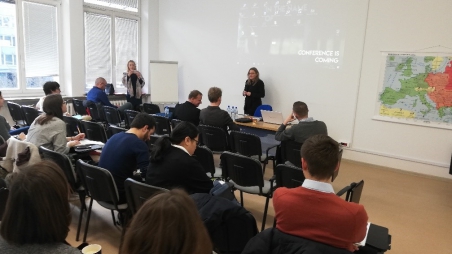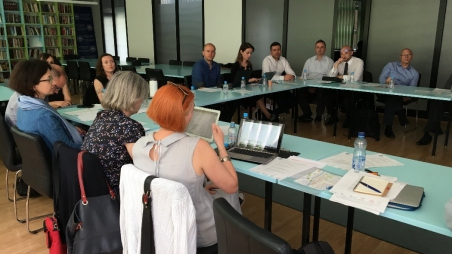



 ETN
Gyors linkek
Kapcsolat
ETN
Gyors linkek
Kapcsolat
 Studienstart
Ösztöndíjak
Szakok
Ph.D. képzés
Jelentkezés
Alumni
Studienstart
Ösztöndíjak
Szakok
Ph.D. képzés
Jelentkezés
Alumni
 Hírlevélre feliratkozás
Hírlevélre feliratkozás


Perspectives on V4 and WB
Das Projekt "Understanding Identities and Regions – Perspectives on V4 and WB" beschäftigt sind mit den Konzepten von Identität in den Regionen der Visegrad (V4)- und Westbalkan (WB)-Staaten. Die Erforschung von Identität von Staaten und Gesellschaften schafft eine Grundlage für ein besseres Verständnis der politischen und sozialen Entwicklung in der westlichen Balkanregion (d.h. Albanien, Bosnien und Herzegowina, Kosovo, Nordmazedonien, Montenegro und Serbien) sowie den Visegrad-Staaten (Ungarn, Polen, Tschechische Republik, und Slowakei). Identität ist konstruiert und unterliegt im Laufe der Zeit Veränderungen. Sie prägt Staaten und Gesellschaften und beeinflusst das politische Verhalten. Die Erforschung von Identität in den Regionen ist von Bedeutung, da die Länder entweder der Europäischen Union beitreten oder ihre Position als aktive Mitglieder in der Union stärken wollen. Ein Schwerpunkt ist somit die nationale und regionale Identität in beiden Regionen.
Die Interpretation von Identitätsaspekten sowie Identitätskonstruktionen im regionalen Kontext liegt diesem Projekt zu Grunde. Das Forschungsfeld soll im Rahmen dieses Projekts um weitere Perspektiven der Experten/innen aus der V4-Region sowie der Westbalkanregion erweitert werden und einige der vielen Fragen im Zusammenhang mit Identität beantworten.
Projektziele
Das Projekt versucht, das Bewusstsein für Identitätsfragen im WB und der V4-Region verständlich zu machen. Das Projekt zielt daher darauf ab, einen akademischen Diskurs zum Thema Identität in den beiden Regionen zu unterstützen, der einem vergleichenden Ansatz zu Grunde liegt. In drei Veranstaltungen werden Wissenschaftler/innen, Forscher/innen und Experten/innen aus den V4- und WB-Länder ihre Forschungsergebnisse diskutieren, sich vernetzen und Forschungsideen austauschen können. Die Ergebnisse dieses wissenschaftlichen Austauschs werden in einem Sammelband, der bis Juli 2020 fertig gestellt werden soll, publiziert werden.
Aktivitäten
Im Rahmen des Projekts findet eine Reihe von Workshops statt. Außerdem wird ein Sammelband zu Thema gemeinsam mit den Projektpartnern erarbeitet.
Ein weiteres Ziel des Projekts ist die Vernetzung von Forschern/innen und Experten/innen, die in diesem Themenfeld forschen.
Das Projektteam nahm auch an der Jahrestagung der Central European Political Science Association (CEPSA) zum Thema Zentraleuropaals eine Zwischenregion im September 2019 an der Universität Pécs teil.
Die Projektdauer ist 24 Monate von 1. November 2018 bis 31. Oktober 2020.
Partner
Das Projekt wird vom International Visegrad Fund finanziert (Grant No.: 21820078). Projektpartner sind:

